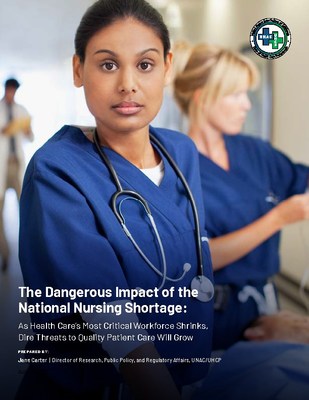
The same nursing shortage that has been a concern for decades is now wreaking havoc on the U.S. health care system. The research findings are undeniable: Our country’s urgent shortage of nurses has reached catastrophic proportions.
While dire, the problem has solutions that we can begin to implement now. As Labor Day approaches, a prominent California-based health care union calls on hospitals, policymakers, and academics to work together to stop the exodus of registered nurses and build more robust pathways for a future generation to attend nursing school and start their careers on solid footing.
Note: Interviews available include labor economist Jane Carter, author of this report, and working nurses and union leaders: television, radio, and print.
LOS ANGELES, Sept. 1, 2022 /PRNewswire/ — One-third of the 3 million registered nurses in the United States will depart the bedside in the coming decade, and not enough new nurses are coming in to meet the growing demand for care—unless we make immediate changes to how we recruit, retain, and respect these essential front-line caregivers, says a new report released by the United Nurses Associations of California/Union of Health Care Professionals (UNAC/UHCP).
The COVID-19 pandemic did not cause the nursing shortage—according to UNAC/UHCP’s comprehensive study and documentation of data from government, private industry, and think tank sources—but months of fighting the unprecedented pandemic have 23poured gasoline on an already raging fire.
UNAC/UHCP, which represents 32,000 health care professionals, the majority in nursing, warns that the nation’s nurse turnover rate is at dangerous levels:
- RNs are quitting their jobs in record numbers over workload, stress, lack of advancement, and pay inequity–new nurses and veterans alike
- The baby boom generation of nurses are taking their retirements and leaving a large gap to fill
- Aspiring nursing students are turned away from programs that cannot hire enough educators or offer enough financial aid
Nurses, the most trusted professionals, spend more time with a typical patient than any other care team member—including physicians. Patient outcomes are tied to nurse well-being in virtually every measure.
Despite the essential role that nurses play in wellness and healing, the woes of the nursing workforce have been allowed to fester. Nurse-to-patient ratios are unenforced or non-existent. Mental health needs remain unassessed and unaddressed. Travel nurse contracts have become the new band-aid for chronic nurse turnover—which has reached upwards of 60% in some hospitals.
The statistics are alarming:
- 34% of nurses say it’s very likely that they will quit their jobs by the end of 2022
- 1 million nurses will be eligible to retire in the next 10 to 15 years
- 23% of nurses from the millennial generation are actively looking for new opportunities
- 80,000 applicants were turned away by nursing schools
The report—The Dangerous Impact of the National Nursing Shortage: As Health Care’s Most Critical Workforce Shrinks, Dire Threats to Quality Patient Care Will Grow—also outlines a clear path to relief:
- Focus on proven ways to retain nurses who leave at the height, or even the beginning, of their careers.
- Create solid pathways to education for financially strapped students and the bedside-experience nurses who want to teach them.
The UNAC/UHCP Research Department report includes personal statements from current RNs who are dedicated but struggling with the departures of their colleagues.
“The nursing shortage is dire. The academic findings validate what our nurses, and others around the nation, face each day,” said Denise Duncan, UNAC/UHCP president and a registered nurse. “We must implement solutions now. The average age of our member nurses is 45. By focusing on improving mentorship, career growth, and wellness, we can increase their potential for many more productive years by the bedside.”
The report also reveals that chronic nursing shortages exact a toll on:
- Patient health:
- adding one patient to a nurse’s caseload raises the probability of patient death by seven percent
- a one-year increase in the average tenure of registered nurses on a hospital unit correlated with a 1.3% decrease in length of stay
- more than 90% of registered nurses in a national poll said the pandemic caused dangerous levels of staffing in their unit
- Hospital finance:
- staffing shortages outweighed financial performance as the top concern for hospital executives for the first time in 17 years
- the average turnover costs result in hospitals losing $4.4 million to $6.9 million each year
- each percentage increase in staff nurse turnover will cost the average hospital an additional $328,400
- Nursing education:
- a national survey of colleges showed that the vacancy rate for full-time nursing faculty rose from 6.5% to 8% in one year
- California is expecting Such estimates predict a shortfall of 82,000 graduates
- program constraints that forced higher education nursing programs to turn away more than 80,000 qualified applicants across the spectrum, ADN, BSN, MSN, and post-graduate candidates
A previous UNAC/UHCP special report, The True Cost of Being a Hero, helped to increase awareness and spur some members of Congress, where HR 1667, the Dr. Lorna Breen Health Care Provider Protection Act, passed both House and Senate.
United Nurses Associations of California/Union of Health Care Professionals (UNAC/UHCP) represents more than 32,000 registered nurses and other health care professionals in California and Hawaii, including optometrists; pharmacists; physical, occupational and speech therapists; case managers; nurse midwives; social workers; clinical lab scientists; physician assistants and nurse practitioners. UNAC/UHCP is affiliated with the National Union of Hospital and Health Care Employees and the American Federation of State, County and Municipal Employees, AFL-CIO.
Anjetta Thackeray | anjetta.thackeray@unacuhcp.org | (909) 455-5146
press@unacuhcp.org
View original content to download multimedia:https://www.prnewswire.com/news-releases/unacuhcp-special-report-we-must-take-action-now-as-national-nursing-shortage-reaches-dangerous-levels-301616849.html
SOURCE United Nurses Associations of California / Union of Health Care Professionals
Source link
The content is by PR Newswire. Headlines of Today Media is not responsible for the content provided or any links related to this content. Headlines of Today Media is not responsible for the correctness, topicality or the quality of the content.


